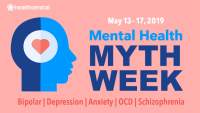If anybody tells you that they know definitively what causes depression—it doesn’t matter if they’re a medical professional, a well-meaning friend, or someone selling essential oils on social media—that person doesn’t know what they’re talking about. One thing we do know: Depression is not a choice and it has exactly零to do with being weak-willed or lazy. Here, we’ll dive into what happens in your brain—and what triggers those brain changes—that can lead to the deep sadness of having depression. By understanding these factors, you can stop blaming yourself or trying to will yourself happy and, instead start showing yourself the empathy a friend would…an important part of the journey of feeling better.
我们的专业面板Depression Causes
We asked some of the nation's top depression experts to bring you the most up-to-date information possible.

Charles B. Nemeroff, M.D., Ph.D.焦虑的首席医疗官和美国,教授和精神病学的主席萧条协会在马尔瓦诊所的神经科学

Jennifer L. Payne, M.D.Director of the Women's Mood Disorders Center and Associate Professor of Psychiatry

Carol A. Bernstein, M.D.Psychiatrist, Vice Chair for Faculty Development and Well-Being in the Departments of Psychiatry and Obstetrics and Gynecology
Don't let your depression rule your life. Visit our comprehensive depression guide for more info.
Read MoreSo, Then, What不Cause Depression?
Sometimes it seems likedepression—a weeks-to-years-long stretch of sadness or hopelessness with symptoms like fatigue, sleep problems, a change in appetite, crying jags, and sometimes even suicidal thoughts—comes out of nowhere.Scientists would love to be able to pinpoint the exact cause of depression, but so far, research has only narrowed it down to biological changes triggered by a whole bunch of factors. These factors can be internal (like genetics, hormonal swings, chronic pain, even gut bacteria) or external (like childhood abuse, loss of a loved one, financial stress, or side effects of medication), and they can all work together simultaneously to make you feel like never getting off the couch again. Let’s dig further into the details.
A Chemical Imbalance (a.k.a. the Tip of the Iceberg)
Depression has been studied for ages. Hippocrates himself believed that melancholia—the pre-medicine name for depression—is caused by a buildup of black bile. Since then, more accurate methods of research have pinpointed an imbalance in brain chemistry. For the last 50 years, scientists have pointed tolow levels of monoamine neurotransmittersthat help regulate mood, digestion, sleep, and other body functions. Doctors aren’t sure what causes these low levels, but they know that antidepressant drugs seem to raise them and make people feel better.
Most medications used today to treat depression operate on this theory, targeting neurotransmitters like去甲肾上腺素,多巴胺, and especiallyserotonin。Even though these drugs are still the most effective first-line treatment, many scientists think of “chemical imbalance” as shorthand for what’s really happening—a more complicated mechanism where neurotransmitters are just part of the story.
抑郁症的其他原因
The truth is, some people are at a higher risk of depression than others for several possible reasons, including:
抑郁症的家族史
Your risk for developingMDD (Major Depressive Disorder, also known as clinical depression)is higher if members of your family have been depressed. But, much like if your family is comprised of Mensa members or ukulele masters, it’s difficult to tell how much of that is due to genetics and how much is due to environmental factors (for example, three hours of mandatory ukulele practice every night).
There is no single gene for depression. A British research team studied more than 800 families with recurrent depression and isolated a chromosome called 3p25-26 that looks promising as a possible genetic link. But another recent British study examined associations between 18 previously studied genes that were thought to be candidates for inherited depression, and found zilch, zero, nada connection. Still, genes are likely to be another piece of the puzzle, and multiple genetic variations are probably involved.
One reason this stuff is so hard to study is that scientists can’t just separate identical twins at birth and see who ends up depressed. That’s totally unethical. The next best thing is to study families and compare identical twins to fraternal twins—the theory being that if depression is genetic, it would show up more in identical twins than in the fraternal type, who share just half their genes (the same as any other sibling).
Scientists who have done these types of experiments place the genetic risk for depression at about 40 percent. That means that even if depression runs in your family, it’s not necessarily your destiny. The remaining 60 percent of depression risk is an emotional crapshoot of other factors, like personal history, social relationships, and environmental circumstances.
Knowing your symptoms can help you determine the next steps. Educate yourself on your depression symptoms.
Read MoreAdverse Childhood Experiences
Little kids are particularly vulnerable to maltreatment and trauma since their brains are still developing, along with their confidence and self-esteem. This trauma doesn’t need to be shocking or violent, though it can be. Abuse (physical, sexual, or emotional), parental neglect, or growing up in a home with an alcohol or drug addict can all leave lasting scars that are linked to depression. Even tough circumstances that don’t measure up to “abuse”—like the loss of a loved one or a nasty divorce—can trigger depression. According to research, 75.6% ofchronically depressed patientsreport clinically significant histories of childhood trauma.
早期的生活创伤可以改变一个人的紧张设定点,炎症,脑连接,和一堆其他的因素。它甚至似乎改变大脑发展的结构,可诱发人们对抑郁症的方法。这不是一般的抑郁症,但严重的抑郁复发,研究显示。用核磁共振成像扫描,科学家发现,这些人有一个更小的表面积,以他们的岛叶皮质,这是负责的自我意识和情绪调节大脑的一部分。
All this means is it’s more important to be mindful about past trauma. Burying the events and trying to avoid emotionally processing them isn’t going to make them go away. In fact, these feelings are likely to grow into (untrue) beliefs that you are unworthy and unsafe in the world, and an inability to trust other people. If you have negative self-beliefs like this, talking with a therapist can help you separate the fact from the fiction and put things into perspective.
Stress
The connection between chronic stress and depression shouldn’t be a huge surprise to anyone who has experienced them. The research backs it up—stressful life events—such as (but not limited to) trauma, death of a friend or family member, an ongoing bad relationship, constant pressure at work or school, caring for aging parents, even reports of terrorism in the media—can activate thehypothalamic-pituitary-adrenal (HPA) axisto spit out extra cortisol. Studies have shown that chronic stress and chronically jacked-up cortisol levels may be responsible for depression.
Some integrative physicians and naturopaths hypothesize that constant exposure to stress—and the body’s fear response, which can make you feel like you’re walking through a haunted house…all the time—can overload the adrenal glands. This condition is calledadrenal fatigue虽然诊断仍内分泌之间的争议。这是不是抑郁症,但它看起来很像抑郁症的症状。
Chronic Pain
neuroplas之间有大量的重叠ticity changes (how the brain tweaks its neural pathways and synapses) caused by pain and depression. That means the two conditions can make each other worse, leading to a frustrating cycle of hurting and hopelessness. Research shows that chronic pain, which is a state of stress, often induces depression. On the flip side, studies reveal that up to 85 percent of people with chronic pain are also depressed, which sounds shockingly high—but not when you consider that pain and mood regulation travel on the same pathways. Think of it as a yellow brick road that leads to Ow and Ugh instead of Oz. These areas of the brain include the insular cortex, prefrontal cortex, anterior cingulate, thalamus, hippocampus, and amygdala.
Other Medical Conditions
就好像生病并不困难不够,某些身体疾病一样,使他们的搭档,抑郁症,在一坐,一起,包括喜欢:
- 甲状腺疾病
- Vitamin B12 and folic acid deficiency,
- Coronary heart disease
- 中风
- Heart attack
- Traumatic brain injury
- Cancer,
- Parkinson’s disease
Their relationship can start a bunch of ways. A serious health issue can change a person’s life in ways that spark depression. Certain conditions (like Parkinson’s, stroke, and traumatic brain injury) create chemical or physiological changes in the brain that lead to depression.
Some research has even found depression to be an early indicator of physical illness in the case of Alzheimer’s, Parkinson’s, Cushing’s syndrome, Wilson’s disease, cardiovascular disease, and others.
没有哪一个先啦,郁闷鸡还是先有蛋心疼,研究表明,人们处理重病和抑郁症是更可能有more severe types of both conditions。And you don’t need a Ph.D. to see how depression might prolong a sick person’s recovery time and overall results.
Medications That Can Contribute to Depression
如今,抑郁症的另一个可能的原因:medication。You’d think a sick person taking their medicine would be a win-win, but some treatments are linked to the onset of depression. Among them are:
- Blood pressure drugsincluding beta-blockers and ACE inhibitors
- Antidepressants像左洛复(舍曲林),Celexa的(西酞普兰),安非他酮(安非他酮),和阿米替林(阿米替林)
- Anti-anxiety drugssuch as Xanax (alprazolam), Klonopin (clonazepam), Valium (diazepam), and Ativan (lorazepam), plus镇静剂like Ambien (zolpidem)
- Corticosteroidslike prednisone, taken for rheumatoid arthritis, lupus, asthma, allergies, or other conditions
- 反酸药-认为proton pump inhibitors像奥美拉唑(奥美拉唑)和耐信(埃索美拉唑)和抗酸药像Pepcid(法莫替丁)
- Anticonvulsants处方用于多种原因,如癫痫,双相性精神障碍,偏头痛和神经疼痛;这些抗惊厥药包括加巴(gabepentin),妥泰(托吡酯),和利必通(拉莫三嗪)
- Hormonal birth controlandhormone therapies像雌二醇、前列腺或保法止(非那雄胺)
Being Female
Women are nearly两倍,可能是男性to be diagnosed with depression. Though scientists aren’t sure exactly why that is, they might be more comfortable taking their symptoms to a doctor, they go through significant hormonal fluctuations, and they’re the victims of more violence and psychological aggression by intimate partners and sexual assault.
And there’s no denying thatcertain types of depressionare primarily lady-centric territory, regardless of how you identify:Premenstrual Dysphoric Disorder (PMDD),围产期抑郁症(PPD), and围绝经期抑郁are all linked to dramatic hormonal changes in a woman’s life.
Risk Factors That Could Be Linked to Depression
与其指责这些抑郁症的“原因”,让我们都同意,这些因素都与抑郁症,直到科学家弄清了抑郁症背后的机制。在这里,我们进一步挖掘到的几个因素可能在抑郁症中发挥作用的细节。
- Sleep issues.A bad night’s sleep might leave you slumped over your cold-brew coffee by lunchtime, but a consistent lack of sleep can turn you into a shell of yourself. (Just ask a new parent. Or someone who lives near an airport.) A big symptom of depression is having ahard time getting to sleepand staying asleep. As it turns out, research shows that people with insomnia havedouble the riskof developing depression as people without sleep problems.
- Unemployment.Americans can get so wrapped up in work that it becomes part of their identity. Losing your job can be a blow to your self-esteem and chip away at your sense of purpose. Research shows that the longer people are unemployed, the more likely they are to be depressed. Twice as likely (12.4%), in fact, as those with full-time jobs (5.6%). When you’ve been unemployed for more than six months, the rate of depression jumps to 18%.
- Loneliness.Loneliness is a strong risk factor for depression,这是一个日益流行。尽管智能手机和社交媒体前所未有的权力来连接我们,最近维信诺公司的调查显示,近half of Americans feel left out单独,和社会隔离。Z世代正处于一个特别难的时候,最高的孤独得分所有世代。
- A Lousy Diet.It shouldn’t be a big surprise that people’s brains work better when they eat nutritious, high-quality fuel. Research shows that folks who eat过多的糖更容易获得抑郁症,但科学家不能确定它是否是由于糖(和多巴胺)高点和低点,慢性炎症,或一些其他机制。相反,人们谁吃healthy Mediterranean diet, with tons of fruits, vegetables and fish, are less likely to develop depressive symptoms in older age.
- Weight.抑郁的人更容易肥胖不是谁不郁闷的人。从近46000人的数据的最近的一项荟萃分析分析发现,减肥,营养增强,和脂肪减少的饮食都会降低抑郁症的症状,即使在没有人临床诊断的疾病。
- 炎。There’s a growing theory among researchers that inflammation may play a role in a percentage of depression cases that don’t respond well to anti-depressants. There’s research showing whytargeting the immune system mightbe a good plan: People with depression have elevated markers of inflammation compared to non-depressed people, studies show. And a recent analysis showed that anti-inflammatory aspirin, statins, and antibiotics actually curbed the depressive symptoms in some people.
- 肠道细菌。A decade ago, studying your gut microbiome for signs of depression might have sounded like reading tea leaves, but today, there’s enough research on themicrobiota-gut-brain axisto get scientists on board. Your microbiome can produce or promote production of neurotransmitters like serotonin, GABA and dopamine. Those neurotransmitters helpregulate bacterial growth, and—going along with the inflammation theory—the suspicion is they can play a role in curbing depression, too. A recent analysis found that people who lack certain bacteria (calledDialisterandCoprococcus——听起来像是恶魔可以召唤亩ty leather book) are more likely to experience depression. Of course, research is ongoing.
- Social Media.We’ve all seen alarming headlines about how endlessly scrolling through Instagram causes FOMO and depression, so it’s normal to worry about your kids (or yourself) being glued to your phone. But the link is more complicated than justhow much screen timeyou rack up. How you spend your time on social media matters. Using it to connect with friends near and far or seek out information is all good. Negative social media behaviors—likecomparing yourself to othersand deciding you don’t measure up or getting anxious over being tagged in fugly photos—do correlate with higher rates of depression, according to recent research.
As you can see, no one is 100% sure of the exact causes of clinical depression yet. But what’s important to note is that we don’t需要to know in order to alleviate the symptoms.Effective treatmentsfor people with depression are available today.
Frequently Asked QuestionsDepression Causes
If depression runs in my family, does that mean I’ll pass it on to my child?
Look, we won’t lie to you—scientists have found that a child’s risk of developing clinical depression later in life is higher if depression runs in their family. But just because there’s a link doesn’t mean it’s written in stone. The research says that genes are responsible for less than half of depression risk, and the rest is external triggers. There’s no one gene for depression. In fact, there’s not even a clear pattern of inheritance! So let’s concentrate on this: There’s no reason to think your child will experience depression, but if they do, you’ve got the tools to help them, make recovery easier to find, and erase any shame they may feel.
难道我的抑郁症的药物可以让我更郁闷?
In a crappy catch-22, yes, it’s possible. Rx pills that change the chemistry in your brain can lead to depression, so it does make sense thatmedications aimed to help with depression属于这一类,如讽刺和令人难以置信的,因为它看起来。据报告任何负面影响到你的心理医生是很重要的,这样,如果一种药物不工作,你可以尝试另一种和,记住,有so许多不同的抗抑郁药。虽然哟u may go through a frustrating period of trial-and-error to figure out which one or which mix is best for you, finding the right option will be worth it.
Can depression be contagious?
Nah. Look, everyone knows a Debbie Downer whose buzzkill energy can destroy a room’s vibe. They may insist they’re just keeping it real, but all that pessimism can rub off after a while. A recent study even backs it up—researchers found that moods can actually spread through social networks like an emotional flu. That means if you hang out with happy people who laugh a lot, you might find yourself giggling after a while. Or if you spend time with annoyed, frustrated people, you’ll likely feel more annoyed and frustrated afterward. However, the study did not find any evidence that these fleeting bad moods blossom into full-blown depression, or that people can pass on depression this way. Long story short, it’s true that bad moods can spread for a short time, but if you’re around someone who’s depressed a lot, you won’t “catch” it.
不social media cause teen depression?
The time teens spend on social media有skyrocketed by 62.5% since 2012, according to a recent eight-year study, and there’s no sign of it slowing. (FYI, they’re at about 2.6 hours per day.) Rates of teen depression are up, so it’s tempting to blame social media, but—despite some alarming headlines—the facts don’t entirely match up. The same study found the amount of time spent on social doesn’t correlate with the risk of depression. That said, other studies have shown links to depression and social media, but it’s hard to form a causal relationship. Since social media can be used a bunch of different ways—some of which are very positive, like connecting with friends and seeking out information—that makes a lot of sense. So, while it’s true that in-person socializing does boost mental health, that doesn’t necessarily mean the opposite is true for online socializing.
- The Role of Bile, per Hippocrates:希波克拉底全集I.(1868年)。W. H. S.琼斯。剑桥。哈佛大学出版社。perseus.tufts.edu/hopper/text?doc=Perseus%3Atext%3A1999.01.0251%3Atext%3DAer.%3Asection%3D10
- Serotonin and Depression: World Psychiatry。(2015).“What has serotonin to do with depression?”ncbi.nlm.nih.gov/pmc/articles/PMC4471964/
- The Role of Genetics: 精神病学的美国杂志。(2006). “A Swedish National Twin Study of Lifetime Major Depression.”ajp.psychiatryonline.org/doi/full/10.1176/appi.ajp.163.1.109
- Twin Studies:Smithsonian. (2016). “A Brief History of Twin Studies.”smithsonianmag.com/science-nature/brief-history-twin-studies-180958281/
- The Stress-Depression Link (1):Current Neuropharmacology。(2015). “The Effects of Psychological Stress on Depression.”ncbi.nlm.nih.gov/pmc/articles/PMC4790405/
- The Stress-Depression Link (2):Cognitive, Affective, and Behavioral Neuroscience。(2001年)。“血清素摄取的增强由皮质醇:压力和抑郁之间的可能的联系”。link.springer.com/content/pdf/10.3758/CABN.1.1.96.pdf
- The Stress-Depression Link (3):Psychoneuroendocrinology。(2018). “Effects of childhood trauma on cortisol levels in suicide attempters and ideators.”sciencedirect.com/science/article/abs/pii/S0306453017312180
- Depression vs. Adrenal Fatigue:BMC Endocrine Disorders。(2016). “Adrenal fatigue does not exist: a systematic review.”bmcendocrdisord.biomedcentral.com/articles/10.1186/s12902-016-0128-4
- Depression and Pain: Archives of Internal Medicine。(2003年)。“抑郁症和疼痛共病。”jamanetwork.com/journals/jamainternalmedicine/fullarticle/216320
- Depression with Other Conditions:Neural Plasticity。(2017). “The Link between Depression and Chronic Pain: Neural Mechanisms in the Brain.”nimh.nih.gov/health/publications/chronic-illness-mental-health/index.shtml
- 睡眠和抑郁症:杂志情感障碍。(2011年)。“失眠抑郁症的预测:纵向流行病学研究的荟萃分析评估。”sciencedirect.com/science/article/abs/pii/S0165032711000292
- Diet and Depression (1):Centers for Disease Control. (2014). “Depression and Obesity in the U.S. Adult Household Population, 2005–2010.”cdc.gov/nchs/products/databriefs/db167.htm
- Diet and Depression (2):Scientific Reports。(2017). “Sugar intake from sweet food and beverages, common mental disorder and depression: prospective findings from the Whitehall II study.”nature.com/articles/s41598-017-05649-7#Sec8
- Diet and Depression (3):Global Psychiatry。(2019). “Adherence to Mediterranean diet and risk of depression later in life. A cross sectional study in East Attica, Greece.”content.sciendo.com/view/journals/gp/2/2/article-p201.xml
- Diet and Depression (4):Psychosomatic Medicine。(2019). “The Effects of Dietary Improvement on Symptoms of Depression and Anxiety.”journals.lww.com/psychosomaticmedicine/Fulltext/2019/04000/The_Effects_of_Dietary_Improvement_on_Symptoms_of.7.aspx
- Social Media and Depression:Computers in Human Behavior。(2019). “Does time spent using social media impact mental health?: An eight year longitudinal study.”sciencedirect.com/science/article/pii/S0747563219303723






